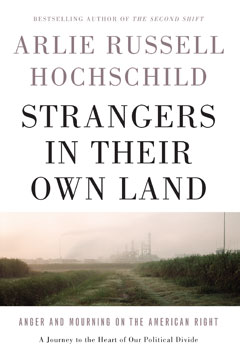Speaking in broad and angry terms about entire classes of citizens, Trump repelled as many people as he rallied to his cause. By the eve of the election, those who loved Trump seem to be living in an entirely different reality from those who didn’t. And now we know just how divided the country is, in hard numbers.
For five years, as part of a study whose results could not be more timely, sociologist Arlie Russell Hochschild traveled the bayous of southern Louisiana, meeting with Tea Party conservatives and trying to understand their thinking about life, hope, faith, and American politics.
Her book, Strangers In Their Own Land: Anger and Mourning on the American Right, tells the story of that experience. It has been nominated for the National Book Award.
Just a few weeks before the election RD’s Eric C. Miller spoke with Hochschild about her project.
Eric Miller: What motivated you to try to empathize with the Tea Party?
Arlie Hochschild: In 2011, when I began researching the book, I was increasingly concerned about a growing divide in America between liberals and conservatives, left and right. Congress was at a standstill and I felt it was time to get out of my bubble in Berkeley, California, go to an equal and opposite enclave, and turn off my alarm system—to permit myself a full curiosity as to why very good people come to such very different conclusions about what is true and good.

Strangers in Their Own Land: Anger and Mourning on the American Right
Arlie Russell Hochschild
The New Press
August 2016
You talk a lot about your struggle to make sense of the “great paradox” of Tea Party thinking. What is it, and why is it such a roadblock to empathy?
Well, I wouldn’t say it’s a roadblock to empathy. It is rather how the world actually looks on one side of the empathy wall. That is, from where I stood, things didn’t make sense. On the whole, in the United States, the red states are poorer, they have worse education, worse medical care, more family disruption, more accidents, more alcohol and substance abuse, worse health, lower life expectancy—all of those problems. Red states also receive more in federal aid than they pay in taxes. And yet, they are politically conservative and take a very dim view of the federal government.
So the paradox is this—if you had that many problems, wouldn’t you want help to get rid of them?
In Louisiana, where I chose to do my research, this is a super paradox. In 2014, it was the poorest state in the union, and 44% of its state budget came from the federal government. But the citizens there heavily favor the Tea Party, and now heavily favor Donald Trump.
None of this got in the way of my empathy, but it did present me with a problem to try to understand—how it all made sense to the people of the state.
What I discovered was that they knew about the paradox, but it was less important to them than what I came to call the “deep story.”
What is the deep story?
We all have a deep story—a story that we tell ourselves about the world, what it is, and how it came to be the way it is. For Tea Partiers, the story imagines America as a long line of people waiting for their shot at the American dream. They see themselves waiting patiently in that line, but up ahead they see people cutting in front of them. Some are black, some are Latino, some are women—and the government seems to be helping them do it.
A deep story is a story that feels true. You take the facts out of it, you take the moral judgments out of it, and you are left with a feeling. That, in a way, is the goal here. That is what the book leads to—the discovery that, on the other side of the empathy wall, this is what people feel. So to empathize with it is to imagine the feeling of being pushed back in line, disrespected, and ultimately, humiliated.
So that’s how I came to empathize with the people I studied. It’s not to say that I agree with them, but I did my best to understand that this is how they feel.
Many of the people you got to know during this experience were religious people. To what extent is their deep story religious?
I don’t think the deep story is religious. But I think religion factors indirectly in that people felt that the church was a source of great comfort to them, and they didn’t think they needed government because the churches often did offer a great number of services. They were tithed, members gave ten percent of their income to sustaining the church, and whatever problem they had, they could take it to the church. It was very central to their lives.
At the same time, they sensed that they were Christians in an America that was becoming increasingly non-Christian, so I often heard them say things like, “You can’t say ‘Merry Christmas’ anymore—you have to say ‘Happy Holidays.’” They felt that even their language was becoming marginalized and needed defending. Many of the meetings I went to began with prayer, a practice that they felt was dying out in the country.
So they felt that they had to be on the defensive in their religiosity, and that their beliefs—that the earth was 5000 years old, that heaven was a cube in the sky—were ridiculed by liberals and Democrats.
One discovery that I made about religion without really looking for it occurred as I was trying to understand how Donald Trump, the most irreligious of people, could win the devotion of deeply religious people.
The guy’s on his third marriage, was propositioning women while his third wife was pregnant, he can’t name a favorite verse or book of the Bible, says he’s never asked God for forgiveness. There are many reasons why, you would think, especially evangelical believers would turn away from him as a candidate.
But I think religious belief opens a way for a charismatic leader like Donald Trump. I actually wrote an op-ed for the Boston Globe on this. I think Trump is offering people the promise of rising to heaven in a sort of secular rapture. There is this belief in a rapture—that the world will come to a sudden end, that believers will rise to heaven, that bad people will be stuck in a world turned to hell, and that God will make the determination which direction you go.
Trump is pitching himself in the role of that God-like figure who is making the determination. He’s often in a judging posture, making quick decisions—“You’re fired,” he says on The Apprentice, or “You’re hired.”
So he fits into the iconography and narrative of belief. If I were to compare some of the pictures of heaven that people have given me—in which everything is golden—and then look at the pictures of Trump Tower, there is a suggestion that I will take you up with me and it speaks to an anxiety people feel about what happens when the rich get richer and the poor get poorer and where we all fit and what hopes we can have for the future. It’s a religious impulse, but Trump speaks to the secular side of it.
I went into your book genuinely hoping to achieve empathy with Tea Partiers and Trump supporters, and there were moments when I felt very close, but ultimately I’m afraid the great paradox is too off-putting for me. Many of the claims your subjects make are based on misunderstandings or bad assumptions or are just factually incorrect, and that feels like a wedge between us. Do you still feel that way?
Well, there is a difference between empathizing and agreeing. People have asked me if, after five years and coming back and writing the book, if my politics have changed. The answer is no—not at all. I still believe in the reality of man-made climate change, the importance of government regulation, etc. I do not now believe the things that the people I studied believe. But I understand how they got to believe the things they believe, the sources of tension in their lives that have made them anxious and fearful, and the sources of information on which they are relying.
At the end of the book I have included an appendix in which many of the beliefs espoused by the subjects are fact-checked against reliable sources. Are 40 percent of Americans working for the federal government? No, it’s 1.9 percent. Do black women have a much higher birth rate than white women? No, it’s about the same. Is everyone on welfare not working? No, most of the people receiving government aid do work, but at such low-paid jobs that we can actually see those welfare benefits as government subsidies to the companies that are under-paying their workers.
I include all of that so that we can be clear about what’s true and what’s not. But that doesn’t mean that we should beat people over the head with the facts or that we should go loggerhead to loggerhead. What I mean to say in this book is that we need a kind of respectful conversation as a nation in order to pull the two sides closer. Climbing the empathy wall is just an initial stage, a first step, toward getting into the right frame of mind to discuss our differences and find some common ground. In my research I did find some common ground, but it feels relatively unexplored at this time.
The more I think about it, the more I am convinced that respect is essential to persuasion. If I don’t respect you, I can’t persuade you, and vice versa. Based on your experience in the South, do you see a way out of this? Is there a way that people from different political persuasions can better communicate with each other?
Yes, I think there is actually a movement started by Joan Blades, co-founder of MoveOn.org, called “Living Room Conversations,” in which left and right get together, break bread, have respectful conversations, and then see if there are some things they can agree on. They know the intention of the conversation, and they come to it hoping to achieve that goal. They commit to it for a while—maybe six sessions.
We know we have differences, but there may be some common ground. What is that common ground?
I would love to see a national movement, a grassroots movement, of people getting out of their enclaves and agreeing to the new rules of reversing the respect deficit. Then, at the level of local leadership and then further on up, let’s see if we can get candidates who are respectful of our agreements and differences. We are one country.
The kinds of issues I found crossover on were things like getting money out of politics, protecting the environment, reducing prison populations, and others. The more specific you are about a particular problem, the more likely you are to find common ground. So a respect-rich context, in which specifics are discussed carefully—I think that’s the way to go.





